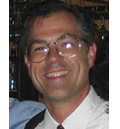Report of the Secretary/Chief Operating OfficerRadiation remains in the news, this time due to the Japanese hurricane and tsunami wreaking havoc on the Daiichi Fukushima nuclear power plant. As I write this report, the Japanese government has increased the level of severity of the nuclear accident to a level 7, the highest level on the International Nuclear Event Scale, and the same level as was a given to the Chornobyl accident. These recent events were painful reminders of Chornobyl and its human toll, the resultant ATA activities and policies, and our limited success toward gaining full acceptance of our recommendations. The recent radiation crisis saw the ATA transition from the expertise of our older expert members, including Lew Braverman and the late Jacob Robbins, to that of the next generation, including Elizabeth Pearce, Mike Tuttle, Jason Wexler, Anca Avram, and Alan Farwell. We have also seen a new generation of thyroidologists experience their first radiation crisis along with its challenges and questions. Which of them will grow to become the experts that advise the ATA on these matters in the future? In the past, the ATA contributed many hours of work towards our nuclear policies. Our recommendations for wider potassium iodide (KI) protection around nuclear power plants have continued to be rebuffed with arguments that American power plants are not vulnerable to the same accident of those in Chornobyl and our population is more iodine replete, and while we have many reactors like those in Japan we do not have the same earthquake risk, and less reliance on backyard cow and goat milk, and on-and-on the rebuttals have gone for more than 25 years. Thus, while we are hesitant to invest the same man-hours of the past with limited returns, The ATA proactively issued several press releases, public statements, and patient brochures during the recent radiation crisis. They can be found at www. thyroid.org. Our goals were to serve the needs of the public and medical professionals by providing them with the best information possible. These high quality and authoritative public activities also maintained the ATA in the minds of the public and media so that, in modern business-speak, the ATA maintained and renewed our "brand" as a reliable source of expertise and opinion regarding radiation and the thyroid. The recent radiation accident also generated lots of public and media inquiries. I am grateful to the many ATA members who volunteered their expertise and time toward these activities. Most newspaper readers have no idea how much time is invested by our members on these short notice media efforts that nearly always are inconvenient with fleeting deadlines, and often only generate a quote or two despite extensive teaching, discussion, and even story editing by the member. CNN and other media outlets emailed lists of questions for experts to immediately reply with answers that may, or may not, ever be used or credited to the author. Recent ATA media notices can be found at the following links: ATA Proposes Guidelines for 131I Radiation Precautions Radioactive Iodine: Recommendations for Public, Patients Experts update recommendations for radioactive iodine therapy for thyroid disease Expand Availability of Anti-Radiation Drug: U.S. Politicians Still, the number of experts able to contribute to ATA public statements and media activities was only a fraction of our membership, and I wonder if the ATA should offer instruction at our annual meetings about media training, radiation health, and radiation physics. How much radiation is allowable in the air, or the water? What levels of environmental radiation should trigger KI usage? How does one calculate the radiation dose to the thyroid from ingested sources? If you have ideas of what lectures on ANY topic the ATA should provide, please submit them at thyroid@thyroid.org. Let's hope that the expanded radiation safety policies of the ATA are never needed, and that governments never regret failing to implement them despite our many pleas. Respectfully,
|


